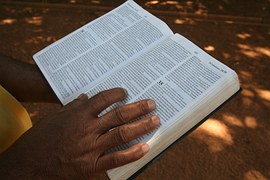-
Recent Posts
- Am I Really A Christian? (Part 4)
- The Greatest Knowledge of All
- How to Pray Like David (Volume 3)
- Why the Bible Makes Life Make Sense
- The Greener Grass of God (Thoughts on Psalm 73)
- How to Understand Difficult Bible Passages
- A Free Bible Study on the Psalms
- Psalm 73 Main Characters
- How to Energize Your Bible Reading
- Words of Wisdom from the Prince of Preachers
- What God Has Done for Us Lately
- How Many People Are in Heaven?
- How Were People Saved in the Old Testament?
- The Glory of God in Our Backyard
- How to Re-ignite Your Bible Reading
Recent Comments
- Wayne Davies on How Many People Are In Hell?
- Jin on How Many People Are In Hell?
- The Greener Grass of God | God Wrote The Book on Psalm 73 Main Characters
- Wayne Davies on Should We Pray the Prayers of David Against Our Enemies? (Thoughts on the Imprecatory Psalms)
- Dan K on Should We Pray the Prayers of David Against Our Enemies? (Thoughts on the Imprecatory Psalms)
Archives
- November 2024
- October 2024
- September 2024
- August 2024
- July 2024
- June 2024
- May 2024
- April 2024
- March 2024
- February 2024
- January 2024
- December 2023
- November 2023
- October 2023
- September 2023
- August 2023
- July 2023
- June 2023
- May 2023
- April 2023
- March 2023
- February 2023
- January 2023
- December 2022
- November 2022
- October 2022
- September 2022
- August 2022
- July 2022
- June 2022
- May 2022
- April 2022
- March 2022
- February 2022
- January 2022
- December 2021
- November 2021
- October 2021
- September 2021
- August 2021
- July 2021
- June 2021
- May 2021
- April 2021
- March 2021
- February 2021
- January 2021
- December 2020
- November 2020
- October 2020
- September 2020
- August 2020
- April 2017
- February 2017
- January 2017
- November 2016
- October 2016
- August 2016
- July 2016
- June 2016
- May 2016
- April 2016
- March 2016
- February 2016
- January 2016
- December 2015
- November 2015
- October 2015
- September 2015
- August 2015
- July 2015
- May 2015
- April 2015
- January 2015
- November 2014
- October 2014
- September 2014
- August 2014
- July 2014
- June 2014
- May 2014
- April 2014
Categories
- Attributes of God
- Bible memorization
- Bible reading
- Bible study
- Bible Study Software
- Book Reviews
- Christmas
- Evangelism
- Faith
- Famous Christians
- Free Books & Other Resources
- Gospel of John Bible Study
- Gospel of Mark Bible Study
- Greatest Commandment
- Holiness
- Hymns
- Jesus Christ
- Knowing God
- Marriage
- Motherhood
- Parenting
- Prayer
- Psalm 119
- Quotes
- Salvation
- Sermons
- Suffering
- Thanksgiving
- Thoughts About God
- Thoughts on the Psalms
- Thoughts on the Thessalonians
- True Religion
- Uncategorized
- What the Bible Says
Got This?
What does it take to get everything in this list?
Knowledge
Wisdom
A prolonged life
Strong confidence
A fountain of life
Satisfaction
Riches and honor
Safety
Friendship with God
The goodness of God
The lack of nothing
The salvation of God
The love of God
The compassion of God
Food
The help of God
Fulfilled desires
If you have this, you get all the above:
The fear of the Lord.
For details, see:
Proverbs 1:7
Proverbs 9:10
Proverbs 10:27
Proverbs 14:26
Proverbs 14:27
Proverbs 19:23
Proverbs 22:4
Proverbs 29:25
Psalm 25:14
Psalm 31:19
Psalm 34:9
Psalm 85:9
Psalm 103:11
Psalm 103:13
Psalm 111:5
Psalm 115:11
Psalm 145:19
Have you ever wondered, “Do Christians follow Jesus just for the benefits?”
I like what C.S. Lewis has to say about that.
 “If we consider the unblushing promises of reward and the staggering nature of the rewards promised in the Gospels, it would seem that Our Lord finds our desires not too strong, but too weak. We are half-hearted creatures, fooling about with drink and sex and ambition when infinite joy is offered us, like an ignorant child who wants to go on making mud pies in a slum because he cannot imagine what is meant by an offer of a holiday at the sea. We are far too easily pleased.”
“If we consider the unblushing promises of reward and the staggering nature of the rewards promised in the Gospels, it would seem that Our Lord finds our desires not too strong, but too weak. We are half-hearted creatures, fooling about with drink and sex and ambition when infinite joy is offered us, like an ignorant child who wants to go on making mud pies in a slum because he cannot imagine what is meant by an offer of a holiday at the sea. We are far too easily pleased.”
Posted in Thoughts About God, Thoughts on the Psalms
Tagged fear of God, fear of the Lord
Leave a comment
How Many People Worldwide Do Not Have the Bible?
 Here’s an amazing yet sad statistic:
Here’s an amazing yet sad statistic:
Over 1 Billion people in the world today do not have the whole Bible in their native language.
That’s not a typo.
The first letter is a “B” as in Billion.
This article provides an informative overview of the current situation, with regard to Bible translation work around the globe.
http://www.desiringgod.org/articles/there-is-no-good-bible-for-over-a-billion-people
May God continue to raise up workers for this all-important task!
A True Story to Rock Your World
It’s Memorial Day weekend in the U.S.A., a holiday we observe to commemorate those who died while serving in our country’s armed forces.
I’ve been thinking a lot lately about believers who have died while serving in the Lord’s army – those who have been killed for their faith in Christ. And more specifically, those who have paid the ultimate price to see that the Bible, the Word of Christ, is preserved and made available to everyone.
One such man is William Tyndale.
Yesterday I read a compelling account of his life’s work. In the early 1500’s, he translated the Bible into English and was martyred for that.
I had heard of him, but didn’t know much about him. Today I am thanking God for raising up men and women like Tyndale, people so committed to God and His truth that they would die for what we take for granted: having the Bible in our own language.
The life of William Tyndale is a testimony to the grace of God and the power of His Word. In 1536 he was convicted of heresy and executed by strangling, his body burned at the stake. He died at 42 without a burial.
What did he believe that was so heretical?
Salvation by grace alone, through faith alone, in Jesus Christ alone.
He was also damned by the church for believing that the Bible should be available to everyone in their own language – in this case, English. He had translated the New Testament from Greek into English, but the church banned the publication of his work. Believe it or not, to possess or even read an English Bible became a crime punishable by death.
There’s much more to the story of this great man of faith. He was one of many who died so you and I could have the Bible in English.
After reading this story, never again will I take my English Bible for granted. So I encourage you to read this 10-page story of courage in the face of persecution and unshakable faith in the God of the Scriptures.
I don’t know what else you’ve got planned for today or tomorrow, but I’m urging you, make time and take time to read this account of William Tyndale’s life and work. You’ll be blessed, you’ll be encouraged, and you’ll be thanking God for what he did and why he died.
Click Here to access the story of William Tyndale in both audio and print formats.
http://www.desiringgod.org/messages/always-singing-one-note-a-vernacular-bible
It’s entitled:
Always Singing One Note – A Vernacular Bible
Why William Tyndale Lived and Died
It’s presented by John Piper of www.DesiringGod.org.
As always, I love feedback, so if Tyndale’s story helps you in any way, please leave your comments below.
The Idiocy of Idolatry
 Have you ever worshipped a stove or a microwave? How about a gas grill?
Have you ever worshipped a stove or a microwave? How about a gas grill?
In effect, that is what God accused Israel of doing through the prophet Isaiah. The people would take a piece of wood and make an idol out of it.
They would bow down to it, pray to it, and offer sacrifices to it, all in hopes of persuading this man-made “god” to bestow favor upon them.
Then they would take the same wood, perhaps the scraps left over from the idol-making project, and use it to make a fire where dinner would be cooked.
The same tree.
Part of it becomes our God.
Part of it becomes a tool to feed us and keep us warm.
The carpenter measures with a line
and makes an outline with a marker;
he roughs it out with chisels
and marks it with compasses.
He shapes it in human form,
human form in all its glory,
that it may dwell in a shrine.
He cut down cedars,
or perhaps took a cypress or oak.
He let it grow among the trees of the forest,
or planted a pine, and the rain made it grow.
It is used as fuel for burning;
some of it he takes and warms himself,
he kindles a fire and bakes bread.
But he also fashions a god and worships it;
he makes an idol and bows down to it.
Half of the wood he burns in the fire;
over it he prepares his meal,
he roasts his meat and eats his fill.
He also warms himself and says,
“Ah! I am warm; I see the fire.”
From the rest he makes a god, his idol;
he bows down to it and worships.
He prays to it and says,
“Save me! You are my god!”
They know nothing, they understand nothing;
their eyes are plastered over so they cannot see,
and their minds closed so they cannot understand.
No one stops to think,
no one has the knowledge or understanding to say,
“Half of it I used for fuel;
I even baked bread over its coals,
I roasted meat and I ate.
Shall I make a detestable thing from what is left?
Shall I bow down to a block of wood?”
Such a person feeds on ashes; a deluded heart misleads him;
he cannot save himself, or say,
“Is not this thing in my right hand a lie?”
Isaiah 44:13-20
Idolatry is idiocy, is it not?
And yet we’ve all done it.
We are come into the world as idolaters, worshipping ourselves from day one. We don’t know any better, and if left to our self-absorbed ways, we turn into little idolaters who become bigger idolaters.
For some, the idolatry never ends. We end up not only worshipping ourselves, but other humans, whether it be our parents or our children or our spouse or our sports and entertainment heroes. Then it gets worse – we go from idolizing people to bowing down to things – our possessions or someone else’s.
We were made to worship greatness. God has placed eternity in our hearts.
The sooner we forsake our idols, the sooner we discover our true purpose in life: worshipping the one and only true God, the Creator of heaven and earth.
“There is no God apart from me,
A righteous God and a Savior,
There is none but me.
Turn to me and be saved,
All you ends of the earth;
For I am God, and there is no other.”
Isaiah 45:21-22
May God save us from ourselves and the idiocy of idolatry.
The Antidote to Self-Pity
 I was listening to a John Piper sermon the other day and was captivated by one particular statement. He said this about Jesus:
I was listening to a John Piper sermon the other day and was captivated by one particular statement. He said this about Jesus:
“Nobody was more worthy of being treated well than Jesus,
and nobody more willingly was treated more badly.”
This comment got me thinking about how I react to people when they treat me badly. It doesn’t happen that often. I live in the U.S.A. and have a very easy life. I don’t get persecuted for my faith like many Christians around the world.
But we all get criticized unfairly or don’t get the credit we think we deserve. You know what I’m talking about, right?
And then there’s Jesus. He should have been treated like royalty, which He is, of course. And He got treated like dirt.
Reflecting on this sobering truth is the antidote for self-pity.
If you’d like to listen to the John Piper sermon mentioned above, Click Here to access it. It’s entitled “Piper Favorites: Four Portraits of Jesus Christ.”
Ephraim on Trial (A Poem on the Justice & Mercy of God)
Lately I’ve been overwhelmed by the mercy and justice of God.
Sometimes, usually in the morning, while reading the Bible and praying, I sit in my chair in the presence of Jesus and all I can do is cry.
About eight years ago I wrote this poem about why I am moved to joyful tears by the goodness of God.
Ephraim on Trial
I sat in the courtroom
Waiting for the Judge.
The air, thick with tension.
The mood, somber.
He walked in
And everyone stood.
The atmosphere changed.
The Judge was present, yet unseen.
His presence, overwhelming.
Invisible, yet manifest.
As he sat on the throne
A banner was unfurled above him.
It read:
“I, the LORD, love justice.”
Isaiah 61:8
We could not see his face
But his voice we could hear.
He declared:
“Hear, O mountains, the LORD’s accusation;
Listen, you everlasting foundations of the earth.
For the LORD has a case against his people;
he is lodging a charge against Israel.”
Micah 6:2
“Hear the word of the LORD, you Israelites,
because the LORD has a charge against you.”
Hosea 4:1
An angel appeared and said to the Judge:
“What are the charges?”
The Judge spoke again:
“Israel’s arrogance testifies against them;
the Israelites, even Ephraim, stumble in their sin;
Judah also stumbles with them.”
Hosea 5:5
“Israel’s arrogance testifies again him,
but despite all this he does not return to the LORD his God or search for him.”
Hosea 7:10
The angel spoke:
“And what is the evidence?”
The Judge opened a book
And gave it to the angel
Who then handed it to me.
The book contained everything
I had ever said, done or thought.
It was the story of my life.
Filled with pride on every page.
The Judge spoke again.
“The defendant is charged with arrogance
And innumerable other offenses.
The list is long.
Theft, lying, lust,
Greed, selfishness, idolatry,
Murder of the heart.
A complete record of all wrongdoing done by this man.
May the court take note that all these transgressions
Are the outgrowth of but one sin.
Pride.”
I then realized the truth.
I am Ephraim.
I was on trial.
I was suddenly filled with panic.
Fear dominated my heart.
Despair consumed me
As my life flashed before me.
The angel asked, “And what is the verdict?”
“Guilty as charged”, said the Judge.
“And what is the penalty?”
“Eternal death in the fire of hell
Where there is weeping
And gnashing of teeth
For all who do not believe.
Things were happening quickly now.
The trial was coming to its end.
And I stood naked before the One
Who knows all.
The angel spoke:
“Will not the Judge of all the earth do right?”
Genesis 18:25
The Judge gave instructions
Regarding the fate of the defendant.
My fate.
“Take him away, far away.
I do not want to see this man
Ever again.”
Unexpectedly
Another Man entered the courtroom.
Like the Judge,
His presence was staggering.
He took our breath away.
Look at his face!
He is the perfect Man.
The God/Man.
Everything that man could be,
Ought to be,
But unable to be,
He is.
The God/Man spoke:
“I have come to defend this man.
And to pay the penalty for his sin.
I will speak to the Judge on his behalf
For I am his defense attorney.
And his sentence-bearer.
“I am here to save him
From the lake of fire.
Where the worm does not die.
And the fire is not quenched.”
This was unbelievable.
Dumbfounded,
I did not understand why
This God/Man would do such a thing.
I cried out.
“But what did I do to deserve this?”
“Nothing,” said the God/Man.
“You deserve to be punished.
Your sins are many.
And they are vile.
If you spend eternity in hell,
Justice will be served.
For you have sinned against Almighty God,
Creator of heaven and earth
And all that is in them.
“The Holy One cannot look at sin.
And your life is filled with filth.
You cannot stand in His presence.
You must be banished forever.
“For it is written:
‘If you kept a record of sins, O Lord, who could stand?’
Psalm 130:3
“But Almighty God,
The Holy One of Israel,
Is also the merciful One.
He is compassionate and gracious,
Slow to anger,
Abounding in love.
He will not always accuse
Nor will he harbor his anger forever.
Psalm 103:8-9
“The Judge has made a way
For your sins to be pardoned,
Your slate to be clean.
“He decreed that
When I died on the cross
My death became your death.
When I died,
I received your punishment.
“I took your place.
“I myself bore your sins in my body on the tree.
1 Peter 2:24
“On the cross,
You and I trade places.
I die your death.
And the wrath of God against your sin
Is poured out on me.
Because I suffered for you,
God’s holy indignation is satisfied.
His anger is spent
And justice is served.
“For I am the One, the only One,
Who can turn aside
God’s tsunami-like anger
By absorbing it.
“I died for sins, once for all,
The righteous for the unrighteous
To bring you to God.
1 Peter 3:18
The gospel was the best news
I had ever heard.
With the gift of repentance in my heart
I cried out,
“Lord, I believe!”
The God/Man took my hand.
“Come, my son.
You can now stand in his presence.
Justified, sanctified, glorified.
Because you are clothed
In my righteousness.
“For it is by grace
You have been saved
Through faith
In me alone.
Ephesians 2:8
“The Father no longer sees your sins,
Nor holds them against you.
For they have been cast
Into the deepest sea.
“When he looks at you
He sees my righteousness
Credited to your account.
“You are,
Now and forever,
Treated as one who is blameless,
Because my holiness has been given to you.
“Come into the presence of the Holy One of Israel
And drink from the river of the water of life
For I have drunk the cup of the wrath of the Judge.”
NOTE: This is one of a serious of posts on the book Knowing God by J.I. Packer. To read the other posts in this series, click here.
Posted in Attributes of God, Knowing God
Tagged justice of God, righteousness of God, wrath of God
14 Comments
How to Pray for the Persecuted Church (Thoughts on Psalm 10)
 Christians around the world face persecution every day. What should we do when non-Christians attack us either verbally or physically? Psalm 10 provides a model prayer for us. Whether you are facing opposition yourself or know of those who are, this psalm provides at least four specific ways to pray the prayer of the persecuted.
Christians around the world face persecution every day. What should we do when non-Christians attack us either verbally or physically? Psalm 10 provides a model prayer for us. Whether you are facing opposition yourself or know of those who are, this psalm provides at least four specific ways to pray the prayer of the persecuted.
Express your frustration to God.
When confronted with unfair treatment, it can seem as if God has abandoned us. This is how the psalmist felt when he prayed, “Why, O LORD, do you stand far off? Why do you hide yourself in times of trouble?” (Psalm 10:1).
Have you ever experienced this type of despair? It is to be expected; we need not be surprised if such feelings surface. Even the most mature believer can struggle with moments of doubt. If this is what you are dealing with today, tell God about it. Be honest with Him. Let Him know that He seems distant and that you are eager for the joy of His presence to become a reality again.
Tell God what is happening.
The wicked often have the upper hand. In Psalm 10:2-11 the psalmist goes into great detail regarding the evil ways of the proud unbeliever. “In his arrogance the wicked hunts down the weak . . . His mouth is full of curses and lies and threats . . . From ambush he murders the innocent . . . His victims are crushed . . . He says to himself, ‘God has forgotten; he covers his face and never sees’” (Psalm 10:2, 7, 8, 11).
This person not only pounces on God’s people, he then claims that God is clueless as to what he’s been doing. He views himself as invincible and above the law.
If you are experiencing such atrocious acts, it is perfectly understandable to cry out to God about it.
Ask God to intervene.
Next, the psalmist urges God to take action and bring the guilty to justice. “Arise, LORD! Lift up your hand, O God. Do not forget the helpless . . . Break the arm of the wicked and evil man; call him to account for his wickedness that would not be found out” (Psalm 10:12, 15).
When we long for sinners to be tried in the courtroom of heaven, we cannot hold such desires inside. We should go to the throne of grace and plead for our deliverance and our enemies’ punishment.
At the same time, in light of Jesus’ command to love our enemies, we should also be praying for God to redeem those who are persecuting us. Yes, I know it seems contradictory, but it is one of those paradoxes of biblical truth. It is appropriate to both pray for justice to prevail and for sinners to be saved.
Find solace in the compassion and sovereignty of God.
The psalmist has poured out his soul from the pit of despair. Things seem hopeless. Yet he has not given up. His faith is intact as he reminds himself of the tenderness of our Savior. “But you, O God, do see trouble and grief” (Psalm 10:14).
Furthermore, the justice of God will ultimately prevail, for “You are the helper of the fatherless . . . You hear, O LORD, the desire of the afflicted; you encourage them, and you listen to their cry, defending the fatherless and the oppressed, in order that man, who is of the earth, may terrify no more” (Psalm 10:14, 17, 18).
We may not know how long the suffering will last, but we do know that one day it will end. When the Messiah returns for His people, the righteousness of God will triumph and the pride of the wicked will be no more, for “The LORD is king for ever and ever” (Psalm 10:16).
In this psalm the writer has traveled from the valley of gloom to the mountaintop of faith. This is the journey of the persecuted saint. It is the hard road of discipleship that Jesus predicted would be our portion. May we persevere in the loving arms of our heavenly father, knowing that “We must go through many hardships to enter the kingdom of God” (Acts 14:22).
Psalm 10 is a gripping reminder that the journey of faith cannot be completed without spending much time on our knees.
How to Find Infinite Joy (Thoughts on Psalm 9)
 In Psalm 9 David cries out to God for justice to prevail – for the guilty to be punished and the righteous to be vindicated. And for good reason: we know what a difficult life he lived, especially in his younger years when he was on the run for his life, the innocent victim of King Saul’s violent outbursts.
In Psalm 9 David cries out to God for justice to prevail – for the guilty to be punished and the righteous to be vindicated. And for good reason: we know what a difficult life he lived, especially in his younger years when he was on the run for his life, the innocent victim of King Saul’s violent outbursts.
We know that one day the justice of God will triumph. That will happen when King Jesus, the greater David, returns to establish His kingdom.
But in the meantime, while we wait, we can do what David did. Regardless of his circumstances, he was able to make these four declarations: “I will praise you, O LORD, with all my heart; I will tell of all your wonders. I will be glad and rejoice in you; I will sing praise to your name, O Most High” (Psalm 9:1-2).
I’d like to focus on the third statement, “I will be glad and rejoice in you,” because when the Bible talks about joy, the most common type of joy is simply “joy in God.” Over and over the psalmists write of their desire to “rejoice in the LORD” (Psalm 32:11; see also Psalm 5:11, 33:21, 35:9, 40:16, 63:11, 64:10, 66:6, 70:4, 85:6).
What does it mean to “rejoice in the LORD”? Joy in God is the intense, celebratory feelings of gladness, delight, pleasure and satisfaction that come from God Himself as we focus on His glorious character and His mighty deeds of salvation performed on our behalf. Furthermore, biblical joy is the blissful wonder and awe we experience when we are consciously aware of His presence. For the Christian, joy in God is available at all times, in any situation. By definition, joy in Him can be found regardless of our circumstances. As Paul wrote, we can be “sorrowful, yet always rejoicing” (2 Corinthians 6:10). This is the joy that David experienced while living as a fugitive, the victim of unjust persecution.
Now let’s turn our attention to the question: “What can I do to increase my biblical joy in God?” Our emotions can be all over the map on any given day, right? And when we talk about biblical joy, we’re not saying that God expects us to be in a state of giddiness 24/7. Life is filled with heartache and disappointment, and Christians have just as much sadness as non-Christians. “Yet man is born to trouble as surely as sparks fly upward” (Job 5:7). Jesus did not promise us a problem-free life. Rather, He promised us a life of difficulty. “In this world you will have trouble” (John 16:33). Again, David is Exhibit A in this regard.
But as 2 Corinthians 6:10 teaches, we can have biblical joy (that deep sense of satisfaction and contentment in God no matter what happens) in the midst of trials and sorrow because our joy is found in Him. How do we experience that kind of joy?
Here’s how David answers this question:
“The precepts of the LORD are right, giving joy to the heart. The commands of the LORD are radiant, giving light to the eyes” (Psalm 19:8).“Your statutes are my heritage forever; they are the joy of my heart” (Psalm 119:111).
As already indicated, the psalms contain many verses describing God as the source of our joy. Then we read Psalm 19:8 and hear the psalmist saying that the Word is the source of my joy. Psalm 119:111 goes even further and teaches that the Word is my joy. Which is it? Is God my joy, or is the Word my joy?
The answer, of course, is both. God and His word are my source of joy. God and His Word are the joy of my heart. This is a teaching found throughout Scripture: God and His Word are described interchangeably.
My Christian friend, do you see how the psalms provide a clear answer to the question, “How do I increase my joy in God?” To increase our joy in the Lord, we simply need to spend more quality time in the Word.
So I challenge you today to take a close look at your life and how you spend your time. Do you regularly, yes daily, drink deeply from the fountains of delight found in the pages of holy Scripture? If not, could that be the main reason you lack the kind of joy in God that David had?
Why not examine yourself to see if this be true?
How Big Is Your Ego and How Great Is Your God? (Thoughts on Psalm 8)
 The psalms are filled with wonderful descriptions of the greatness of God. Psalm 8 is no exception. Or is it? Let’s take a look at this ancient hymn so we can increase our praise vocabulary and encourage one another by focusing on God instead of ourselves.
The psalms are filled with wonderful descriptions of the greatness of God. Psalm 8 is no exception. Or is it? Let’s take a look at this ancient hymn so we can increase our praise vocabulary and encourage one another by focusing on God instead of ourselves.
This psalm begins and ends with the same exclamation of adoration: “O LORD, our Lord, how majestic is your name in all the earth!” (Psalm 8:1 and Psalm 8:9). David wants to direct our attention to the one who is called both “LORD,” (or Yahweh, the special name for God that means “I Am”, a reference to God’s eternal self-existence) and “Lord” (or Adonai, the title that refers to God’s sovereignty over all creation.)
How long have humans been in existence? Whether you’re an evolutionist or a creationist, either way we’ve only been here a fraction of the time that God has been around, because He has existed from all eternity and is the only one who can say, “I am that I am.” And even though humans have accomplished much over the centuries, when was the last time we created something out of nothing?
Calling God “LORD” and “Lord” in the same breath gives us plenty for which to praise him! But David doesn’t stop there. He then proclaims, “You have set your glory above the heavens” (Psalm 8:1b) and a few verses later he writes, “When I consider your heavens, the work of your fingers, the moon and the stars, which you have set in place, what is man that you are mindful of him, the son of man that you care for him? You made him a little lower than the heavenly beings and crowned him with glory and honor” (Psalm 8:3-5).
At first glance it may appear that David’s focus has shifted from God to man and that we should start thinking about our greatness rather than God’s. Certainly God has endowed mankind with much dignity, giving us the tremendous responsibility of ruling over his world as God’s vice-regent.
If we didn’t have the New Testament, this might be the logical place to conclude our thoughts on Psalm 8. Yet Jesus and the apostles did not see this psalm as primarily a description of the greatness of man. Rather, they viewed Psalm 8 as mainly a description of the one and only God-Man, Jesus the divine “Son of Man.”
In fact, there are four New Testament passages that see Jesus as the ultimate fulfillment of Psalm 8. Jesus himself quoted Psalm 8:2 on Palm Sunday when the chief priests were indignant at the praise he was receiving from children shouting, “Hosanna to the Son of David” (Matthew 21:16). Furthermore, the psalmist’s statement that God “has put everything under his feet” (Psalm 8:6) is quoted by Paul twice (1 Corinthians 15:27 and Ephesians 1:22) as a reference to Jesus.
But the longest and arguably most compelling New Testament reference to Psalm 8 is found in Hebrews 2:5-9, where verses 4-6 are quoted as a testimony to the magnificence of Jesus. He is the one who “was made a little lower than the angels” through the incarnation. Furthermore, “because he suffered death,” Jesus is now “crowned with glory and honor” and is the only one capable of “bringing many sons to glory” through the salvation he accomplished on the cross.
When reading Psalm 8, how tempting it is to think too highly of ourselves. Jesus, Paul and the writer of Hebrews want us to realize that only Jesus is worthy of glory spoken of in this psalm. May we never forget that it is only by the grace of God that we are privileged to share in that glory. Unlike the divine Son of God, we receive such honor as a gift from above. In stark contrast, Jesus possessed this glory from eternity past and temporarily set it aside to become “the author of [our] salvation.”
For this act of mercy we will forever sing with David, “O LORD, our Lord, how majestic is your name in all the earth!” (Psalm 8:9).
Posted in Thoughts on the Psalms
Tagged greatness of God, Hebrews 2:5-9, majesty of God, Psalm 8
Leave a comment






